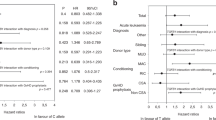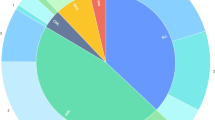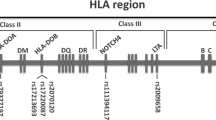Abstract
The benefit of survival at the expense of new GVHD after DLI for acute leukemia following human allogeneic hematopoietic cell transplantation (allo-HCT) remains a matter of controversy. The detection of biological markers predicting this outcome would be an enormous breakthrough. The purpose of this study was the analysis of CT60 single-nucleotide polymorphism (SNP) of the CTLA-4 T-regulatory gene as a surrogate marker for DLI outcome in this difficult setting. Using Pyrosequencing, we genotyped the alleles of the CT60 SNP of 79 DLI donors and correlated them with the post-DLI outcome of their matching recipients. The presence of a donor ‘AA’ or ‘AG’ CT60 genotype vs a ‘GG’ genotype was an independent factor for remaining in complete chimerism/remission post-DLI (odds ratio (OR) 2.61 vs 0.42, respectively, P=0.05). Further, in cases with evident post-DLI allo-reactivity the importance of an ‘AA’ or ‘AG’ vs a ‘GG’ genotype gained significance for ongoing complete chimerism (OR 4.35 vs 0.32, P=0.03). Neither alterations in cumulative DLI dose nor any other clinical parameter significantly weakened the importance of CT60 SNP. Our results provide evidence for the necessity of genotyping CT60 SNP prior to DLI administration in patients with acute leukemia.
This is a preview of subscription content, access via your institution
Access options
Subscribe to this journal
Receive 12 print issues and online access
$259.00 per year
only $21.58 per issue
Buy this article
- Purchase on Springer Link
- Instant access to full article PDF
Prices may be subject to local taxes which are calculated during checkout
Similar content being viewed by others
References
Dazzi F, Szydlo RM, Cross NCP, Craddock C, Kaeda J, Kanfer E et al. Durability of responses following donor lymphocyte infusions for patients who relapse after allogeneic stem cell transplantation for chronic myeloid leukemia. Blood 2000; 96: 2712–2716.
Collins RH, Shpilberg O, Drobyski WR, Porter DL, Giralt S, Champlin R et al. Donor leukocyte infusions in 140 patients with relapsed malignancy after allogeneic bone marrow transplantation. J Clin Oncol 1997; 15: 433–444.
Schmid C, Labopin M, Nagler A, Bornhäuser M, Finke J, Fassas A et al. Donor lymphocyte infusion in the treatment of first hematological relapse after allogeneic stem-cell transplantation in adults with acute myeloid leukemia: a retrospective risk factors analysis and comparison with other strategies by the EBMT Acute Leukemia Working Party. J Clin Oncol 2007; 25: 4938–4945.
Slavin S, Morecki S, Weiss L, Or R . Donor lymphocyte infusion: the use of alloreactive and tumor-reactive lymphocytes for immunotherapy of malignant and non-malignant diseases in conjunction with allogeneic stem cell transplantation. J Hemat Stem Cell Res 2002; 11: 265–276.
Gough SC, Walker LS, Sansom DM . CTLA4 gene polymorphism and autoimmunity. Immunol Rev 2005; 204: 102–115.
Waterhouse P, Penninger JM, Timms E, Wakeham A, Shahinian A, Lee KP et al. Lymphoproliferative disorders with early lethality in mice deficient in Ctla-4. Science 1995; 270: 985–988.
Pérez-García A, Cámara R, Román-Gómez J, Jiménez-Velasco A, Encuentra M, Nieto JB et al. CTLA-4 polymorphisms and clinical outcome after allogeneic stem cell transplantation from HLA- identical sibling donors. Blood 2007; 110: 461–467.
Ueda H, Howson JM, Esposito L, Esposito L, Heward J, Snook H et al. Association of the T-cell regulatory gene CTLA-4 with susceptibility to autoimmune disease. Nature 2003; 423: 506–511.
Anjos SM, Shao W, Marchand L, Polychronakos C . Allelic effects on gene regulation at the autoimmunity-predisposing CTLA4 locus: a re-evaluation of the 3′ +6230G>A polymorphism. Genes Immunity 2005; 6: 305–311.
Przepiorka D, Weisdorf D, Martin P, Klingemann HG, Beatty P, Hows J et al. 1994 Consensus Conference on acute GVHD grading. BMT 1995; 15: 825–828.
Pérez-García A, Brunet S, Berlanga JJ, Tormo M, Nomdedeu J, Guardia R et al. CTLA-4 genotype and relapse incidence in patients with acute myeloid leukemia in first complete remission after induction chemotherapy. Leukemia 2009; 23: 486–491.
Gogas H, Dafni U, Koon H, Spyroupoulou-Vlachou M, Metaxas Y, Buchbinder E et al. Evaluation of six CTLA-4 polymorphisms in high-risk melanoma patients receiving adjuvant interferon therapy in the He13A/98 multicenter trial. J Trans Med 2010; 8: 108–112.
Author information
Authors and Affiliations
Corresponding author
Ethics declarations
Competing interests
The authors declare no conflict of interest.
Rights and permissions
About this article
Cite this article
Metaxas, Y., Bertz, H., Spyridonidis, A. et al. CT60 single-nucleotide polymorphism as a surrogate marker for donor lymphocyte infusion outcome after allogeneic cell transplantation for acute leukemia. Bone Marrow Transplant 47, 411–415 (2012). https://doi.org/10.1038/bmt.2011.101
Received:
Revised:
Accepted:
Published:
Issue Date:
DOI: https://doi.org/10.1038/bmt.2011.101
Keywords
This article is cited by
-
CTLA-4 polymorphisms: influence on transplant-related mortality and survival in children undergoing allogeneic hematopoietic stem cell transplantation
Journal of Cancer Research and Clinical Oncology (2018)
-
PD-1 genotype of the donor is associated with acute graft-versus-host disease after HLA-identical sibling donor stem cell transplantation
Annals of Hematology (2018)
-
Identification and Utilization of Donor and Recipient Genetic Variants to Predict Survival After HCT: Are We Ready for Primetime?
Current Hematologic Malignancy Reports (2015)



